人教版2019必修第一册Unit4 Natural disasters ReadingandThinking课件(22张ppt)
文档属性
| 名称 | 人教版2019必修第一册Unit4 Natural disasters ReadingandThinking课件(22张ppt) | 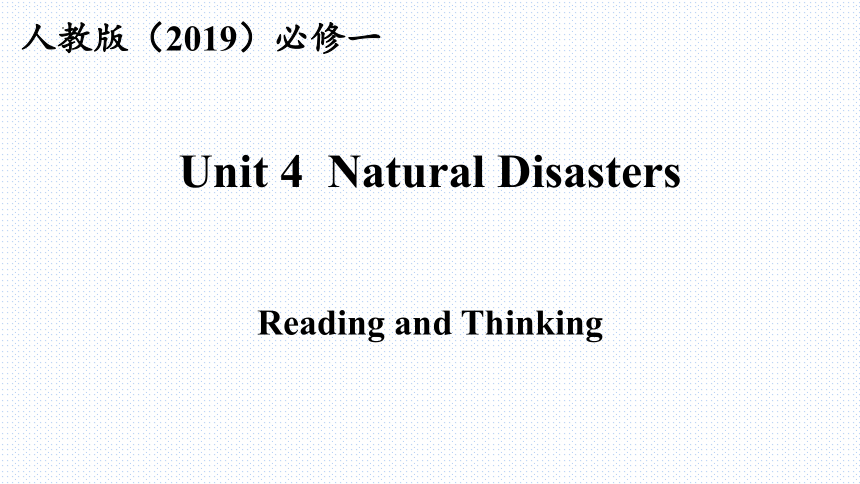 | |
| 格式 | zip | ||
| 文件大小 | 232.1KB | ||
| 资源类型 | 教案 | ||
| 版本资源 | 人教版(2019) | ||
| 科目 | 英语 | ||
| 更新时间 | 2022-05-12 15:02:58 | ||
图片预览

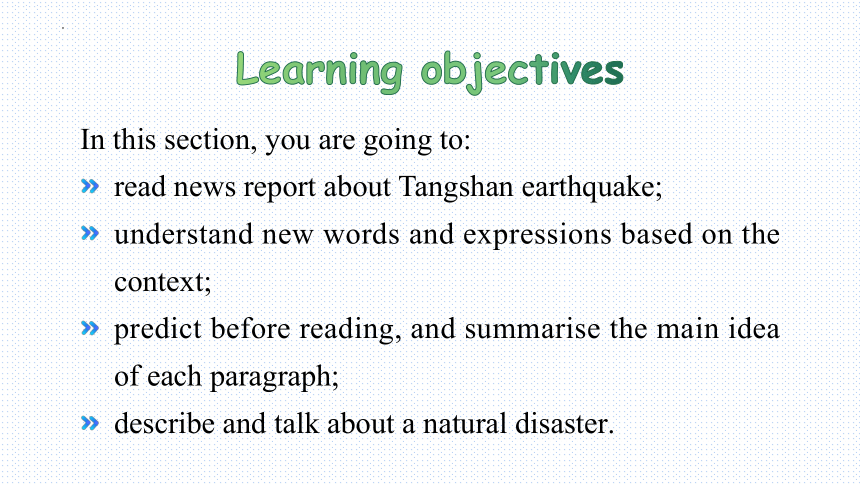
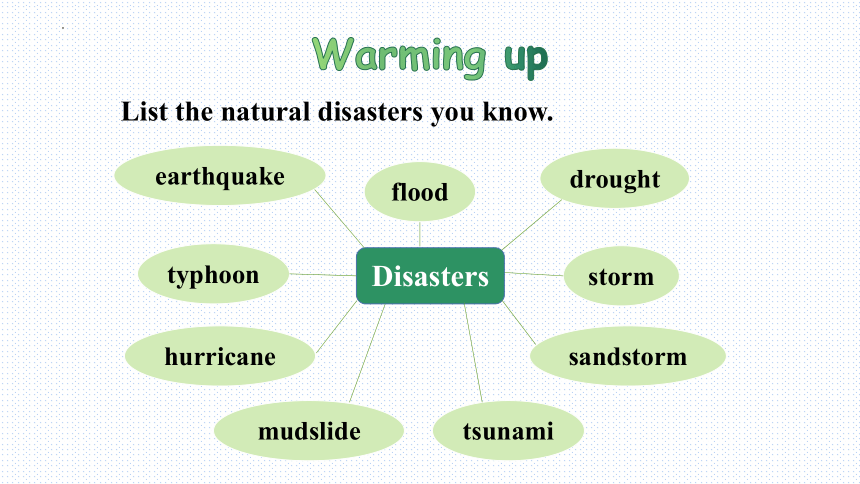
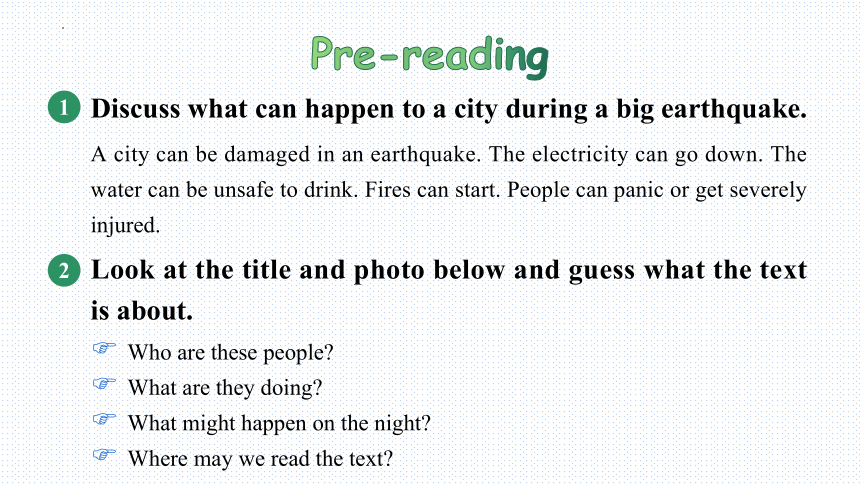
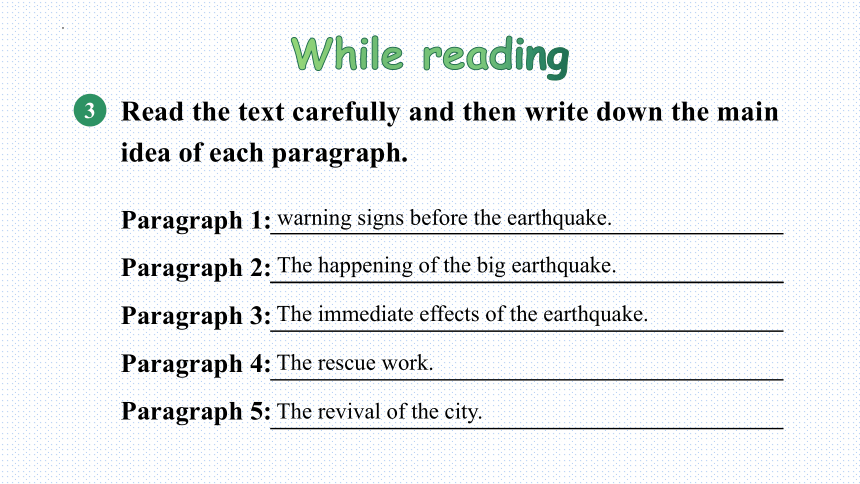
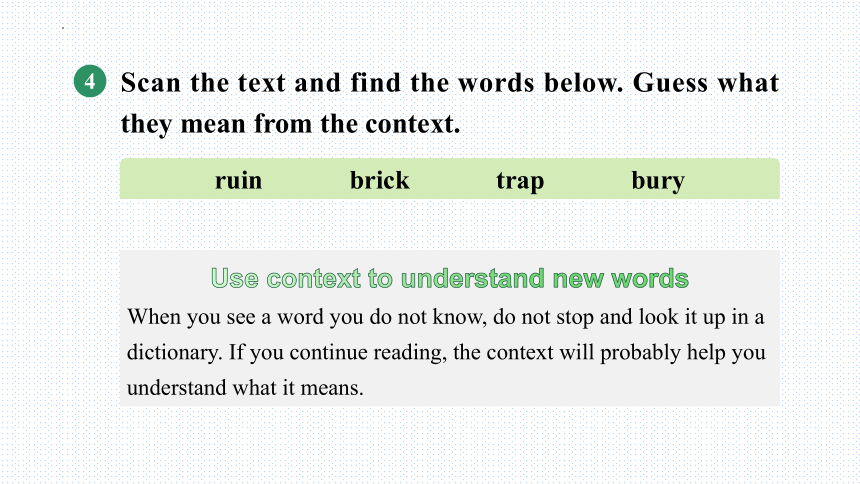
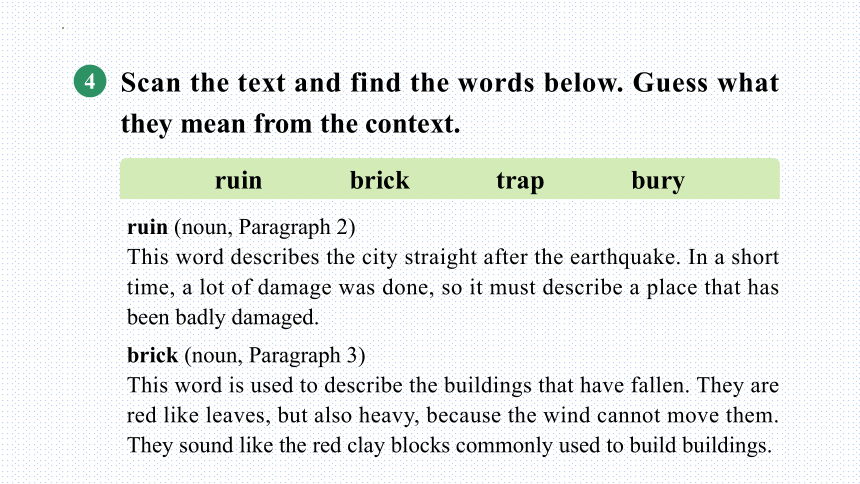
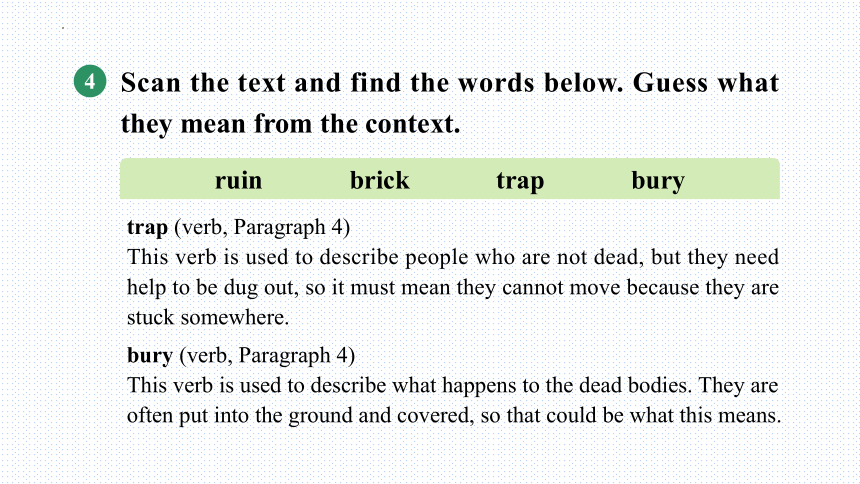
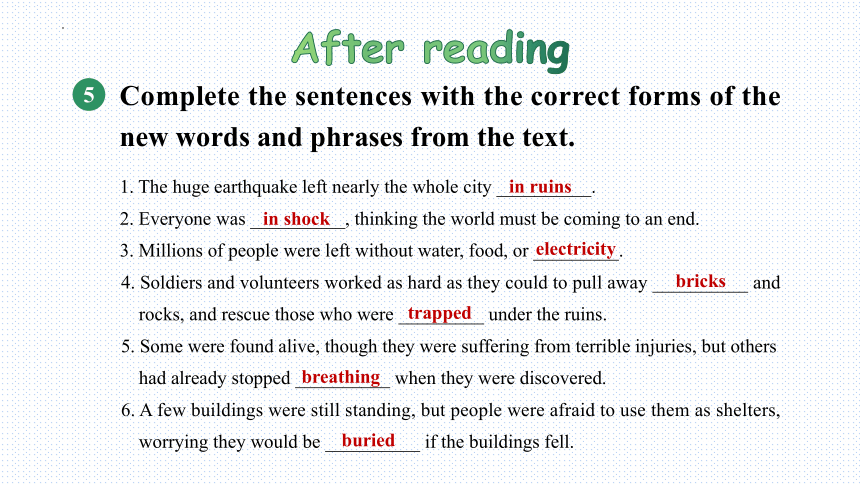
文档简介
(共22张PPT)
人教版(2019)必修一
Unit 4 Natural Disasters
Reading and Thinking
In this section, you are going to:
read news report about Tangshan earthquake;
understand new words and expressions based on the context;
predict before reading, and summarise the main idea of each paragraph;
describe and talk about a natural disaster.
Learning objectives
Disasters
earthquake
flood
typhoon
hurricane
mudslide
tsunami
sandstorm
storm
drought
Warming up
List the natural disasters you know.
Pre-reading
Discuss what can happen to a city during a big earthquake.
1
A city can be damaged in an earthquake. The electricity can go down. The water can be unsafe to drink. Fires can start. People can panic or get severely injured.
Who are these people
What are they doing
What might happen on the night
Where may we read the text
Look at the title and photo below and guess what the text is about.
2
While reading
Read the text carefully and then write down the main idea of each paragraph.
3
Paragraph 1:
Paragraph 2:
Paragraph 3:
Paragraph 4:
Paragraph 5:
warning signs before the earthquake.
The happening of the big earthquake.
The immediate effects of the earthquake.
The rescue work.
The revival of the city.
ruin brick trap bury
Use context to understand new words
When you see a word you do not know, do not stop and look it up in a dictionary. If you continue reading, the context will probably help you understand what it means.
Scan the text and find the words below. Guess what they mean from the context.
4
Scan the text and find the words below. Guess what they mean from the context.
4
ruin (noun, Paragraph 2)
This word describes the city straight after the earthquake. In a short time, a lot of damage was done, so it must describe a place that has been badly damaged.
brick (noun, Paragraph 3)
This word is used to describe the buildings that have fallen. They are red like leaves, but also heavy, because the wind cannot move them. They sound like the red clay blocks commonly used to build buildings.
ruin brick trap bury
Scan the text and find the words below. Guess what they mean from the context.
4
trap (verb, Paragraph 4)
This verb is used to describe people who are not dead, but they need help to be dug out, so it must mean they cannot move because they are stuck somewhere.
bury (verb, Paragraph 4)
This verb is used to describe what happens to the dead bodies. They are often put into the ground and covered, so that could be what this means.
ruin brick trap bury
1. The huge earthquake left nearly the whole city __________.
2. Everyone was __________, thinking the world must be coming to an end.
3. Millions of people were left without water, food, or _________.
4. Soldiers and volunteers worked as hard as they could to pull away __________ and rocks, and rescue those who were _________ under the ruins.
5. Some were found alive, though they were suffering from terrible injuries, but others had already stopped __________ when they were discovered.
6. A few buildings were still standing, but people were afraid to use them as shelters, worrying they would be __________ if the buildings fell.
Complete the sentences with the correct forms of the new words and phrases from the text.
5
in ruins
in shock
electricity
breathing
buried
bricks
trapped
After reading
Read the text again and answer the questions.
6
1. What were some of the strange things happening before the earthquake Do you think they were warning signs Why or why not
Before the earthquake, the water in the village wells rose and fell. Deep cracks appeared in their walls. Animals were acting strangely. I think these were warning signs as this doesn’t usually happen and it showed something strange was happening below the ground. Sometimes, animals have more sensitive reactions to some coming dangers.
2. What does the writer mean by “Slowly, the city began to breathe again”
The writer means that the city began to function again, because the earthquake had stopped people and supplies moving about, and so it was like the city couldn’t breathe.
3. What kind of help do you think people who have suffered an earthquake need
People in places who have suffered an earthquake need quick access to basic things such as water and food, because they cannot get them easily. They also need medical care, not just for injuries, but to protect against disease and other problems that happen after the earthquake. Last but not least, these people also need psychological care and help.
Work in groups. Discuss the questions.
7
1. What do you think helped in the revival of Tangshan city
I think the revival of Tangshan was helped by the strong support of the government and the people who all worked in unity to rebuild the city even better than before.
2. What other cities or towns have gone through similar changes What lessons can we learn from these events
Wenchuan county and some other towns near Wenchuan have the similar experiences. These towns were built up from the ruins. As well as developing better ways to detect and prepare for these disasters, we have learnt that acting quickly and in unity is the best way to get over such disasters. The strong support from government and people around are also very important.
Language points
1. It seemed as if the world were coming to an end!
as if是一个连词结构,用来引导从句,意为“好像;似乎;仿佛”。从句根据说话人所陈述内容的真实性或可能性,可用陈述语气或虚拟语气。如:
She looked as if she’d had some bad news.
They stared at me as if I was crazy.
She talks as if she knows everything.
【句型拓展】
It+seems/seemed (+to sb. )+that ... (对某人来说)好像……;似乎……
There seems to be ... 好像有……
2. Hard hills of rock became rivers of dirt.
作者使用了隐喻(metaphor)的修辞方法,将泥石流比喻成河流。
在使用隐喻来进行描述的时候,我们通常把被描写的事物比喻成与之相似的事物,但不在句子中使用like,as等表示“像”的词语。例如:
I was moved by her sunny smile.
He has a heart of stone.
【拓展】
明喻(simile)的修辞方法不同于隐喻,它是直接在句子中使用like,as等表示“像”的词语,来明确地比喻和描述。例如:
Bricks covered the ground like red autumn leaves.
3. In less than one minute, a large city lay in ruins.
ruin n. & vt. 破坏;毁坏
in ruins 严重受损;破败不堪
e.g. This illness has ruined my life.
We visited a Roman ruin.
Berlin was in ruins after World War Ⅱ.
根据提示补全句子。
(1) After the flood, the houses along the river were _____________ (严重受损).
(2) You’ll completely ______________ (毁了这些花) if you touch them.
in ruins
ruin the flowers
用ruin/destroy/damage完成句子。
(1) The rainforests are being at a frightening rate.
(2) Many buildings were badly during the war.
(3) Her injury her chances of winning the race.
destroyed
damaged
ruined
【辨析】ruin; destroy; damage
ruin 强调程度,指完全毁掉,用于具体的事物时,指该事物虽然被毁坏,但依然存在。
destroy 常指彻底地、毁灭性地破坏某事物,使其不再存在、不能或很难再使用或修复。
damage 可以用于某物或某人的身体,表示使之失去价值或功能;也可用于感情、信心等,表示产生不良影响。
4. About 75 percent of the city’s factories and buildings, 90 percent of its homes, and all of its hospitals were gone.
本句是简单句。句中有三个主语,分别是:About 75 percent of the city’s factories and buildings, 90 percent of its homes和all of its hospitals。
【百分数&分数】
表示百分之……用percent。
e.g. 65 percent of the houses
先分子,后分母;分子用基数词,分母用序数词。分子大于1时,分母用复数形式。
e.g. 二分之一 a half/one half
五分之一 one fifth
三分之二 two thirds
四分之一 one fourth/a quarter/one quarter
二又五分之三 two and three fifths
5. Slowly, the city began to breathe again.
作者在这句话中使用了拟人(personification)的修辞方法,把事物人格化,将事物变成和人一样,会做出动作或拥有感情。例如:
The wind whispered through dry grass.
The wild fire swallowed the entire forest.
【词汇】
breathe vi. & vt. 呼吸
e.g. I’m too tired to breathe.
It’s good for people to breathe fresh air.
Please breathe in and then breathe out slowly.
【词汇拓展】
breath n. 呼吸
hold one’s breath 屏息;闭气
take a deep breath 深呼吸
out of breath 喘不过气;上气不接下气
catch one’s breath (跑或激烈运动后)喘口气
waste your breath 白费唇舌
e.g. Let’s hold our breath and see what will happen.
He took a deep breath, desperately trying to keep calm.
When we climbed to the top of the building, we were out of breath.
The news was so unexpected that I caught my breath from shock.
Words & phrases
as if
ruin
in ruins
percent
metal
shock
in shock
似乎;好像;仿佛
n. & vt. 破坏;毁坏
严重受损;破败不堪
n. 百分之…… adj. & adv. 每一百中
n. 金属
n. 震惊;令人震惊的事;休克
vt. (使)震惊
震惊;吃惊
electricity
trap
bury
breathe
effort
wisdom
context
suffer
n. 电;电能
vt. 使落入险境;使陷入圈套
n. 险境;陷阱
vt. 埋葬;安葬
vi. & vt. 呼吸
n. 努力;艰难的尝试;尽力
n. 智慧;才智
n. 上下文;语境;背景
vt. 遭受;蒙受
vi. (因疾病、痛苦、悲伤等)受苦
Words & phrases
Homework
1. Review the new words and phrases.
2. Write a summary of the passage.
人教版(2019)必修一
Unit 4 Natural Disasters
Reading and Thinking
In this section, you are going to:
read news report about Tangshan earthquake;
understand new words and expressions based on the context;
predict before reading, and summarise the main idea of each paragraph;
describe and talk about a natural disaster.
Learning objectives
Disasters
earthquake
flood
typhoon
hurricane
mudslide
tsunami
sandstorm
storm
drought
Warming up
List the natural disasters you know.
Pre-reading
Discuss what can happen to a city during a big earthquake.
1
A city can be damaged in an earthquake. The electricity can go down. The water can be unsafe to drink. Fires can start. People can panic or get severely injured.
Who are these people
What are they doing
What might happen on the night
Where may we read the text
Look at the title and photo below and guess what the text is about.
2
While reading
Read the text carefully and then write down the main idea of each paragraph.
3
Paragraph 1:
Paragraph 2:
Paragraph 3:
Paragraph 4:
Paragraph 5:
warning signs before the earthquake.
The happening of the big earthquake.
The immediate effects of the earthquake.
The rescue work.
The revival of the city.
ruin brick trap bury
Use context to understand new words
When you see a word you do not know, do not stop and look it up in a dictionary. If you continue reading, the context will probably help you understand what it means.
Scan the text and find the words below. Guess what they mean from the context.
4
Scan the text and find the words below. Guess what they mean from the context.
4
ruin (noun, Paragraph 2)
This word describes the city straight after the earthquake. In a short time, a lot of damage was done, so it must describe a place that has been badly damaged.
brick (noun, Paragraph 3)
This word is used to describe the buildings that have fallen. They are red like leaves, but also heavy, because the wind cannot move them. They sound like the red clay blocks commonly used to build buildings.
ruin brick trap bury
Scan the text and find the words below. Guess what they mean from the context.
4
trap (verb, Paragraph 4)
This verb is used to describe people who are not dead, but they need help to be dug out, so it must mean they cannot move because they are stuck somewhere.
bury (verb, Paragraph 4)
This verb is used to describe what happens to the dead bodies. They are often put into the ground and covered, so that could be what this means.
ruin brick trap bury
1. The huge earthquake left nearly the whole city __________.
2. Everyone was __________, thinking the world must be coming to an end.
3. Millions of people were left without water, food, or _________.
4. Soldiers and volunteers worked as hard as they could to pull away __________ and rocks, and rescue those who were _________ under the ruins.
5. Some were found alive, though they were suffering from terrible injuries, but others had already stopped __________ when they were discovered.
6. A few buildings were still standing, but people were afraid to use them as shelters, worrying they would be __________ if the buildings fell.
Complete the sentences with the correct forms of the new words and phrases from the text.
5
in ruins
in shock
electricity
breathing
buried
bricks
trapped
After reading
Read the text again and answer the questions.
6
1. What were some of the strange things happening before the earthquake Do you think they were warning signs Why or why not
Before the earthquake, the water in the village wells rose and fell. Deep cracks appeared in their walls. Animals were acting strangely. I think these were warning signs as this doesn’t usually happen and it showed something strange was happening below the ground. Sometimes, animals have more sensitive reactions to some coming dangers.
2. What does the writer mean by “Slowly, the city began to breathe again”
The writer means that the city began to function again, because the earthquake had stopped people and supplies moving about, and so it was like the city couldn’t breathe.
3. What kind of help do you think people who have suffered an earthquake need
People in places who have suffered an earthquake need quick access to basic things such as water and food, because they cannot get them easily. They also need medical care, not just for injuries, but to protect against disease and other problems that happen after the earthquake. Last but not least, these people also need psychological care and help.
Work in groups. Discuss the questions.
7
1. What do you think helped in the revival of Tangshan city
I think the revival of Tangshan was helped by the strong support of the government and the people who all worked in unity to rebuild the city even better than before.
2. What other cities or towns have gone through similar changes What lessons can we learn from these events
Wenchuan county and some other towns near Wenchuan have the similar experiences. These towns were built up from the ruins. As well as developing better ways to detect and prepare for these disasters, we have learnt that acting quickly and in unity is the best way to get over such disasters. The strong support from government and people around are also very important.
Language points
1. It seemed as if the world were coming to an end!
as if是一个连词结构,用来引导从句,意为“好像;似乎;仿佛”。从句根据说话人所陈述内容的真实性或可能性,可用陈述语气或虚拟语气。如:
She looked as if she’d had some bad news.
They stared at me as if I was crazy.
She talks as if she knows everything.
【句型拓展】
It+seems/seemed (+to sb. )+that ... (对某人来说)好像……;似乎……
There seems to be ... 好像有……
2. Hard hills of rock became rivers of dirt.
作者使用了隐喻(metaphor)的修辞方法,将泥石流比喻成河流。
在使用隐喻来进行描述的时候,我们通常把被描写的事物比喻成与之相似的事物,但不在句子中使用like,as等表示“像”的词语。例如:
I was moved by her sunny smile.
He has a heart of stone.
【拓展】
明喻(simile)的修辞方法不同于隐喻,它是直接在句子中使用like,as等表示“像”的词语,来明确地比喻和描述。例如:
Bricks covered the ground like red autumn leaves.
3. In less than one minute, a large city lay in ruins.
ruin n. & vt. 破坏;毁坏
in ruins 严重受损;破败不堪
e.g. This illness has ruined my life.
We visited a Roman ruin.
Berlin was in ruins after World War Ⅱ.
根据提示补全句子。
(1) After the flood, the houses along the river were _____________ (严重受损).
(2) You’ll completely ______________ (毁了这些花) if you touch them.
in ruins
ruin the flowers
用ruin/destroy/damage完成句子。
(1) The rainforests are being at a frightening rate.
(2) Many buildings were badly during the war.
(3) Her injury her chances of winning the race.
destroyed
damaged
ruined
【辨析】ruin; destroy; damage
ruin 强调程度,指完全毁掉,用于具体的事物时,指该事物虽然被毁坏,但依然存在。
destroy 常指彻底地、毁灭性地破坏某事物,使其不再存在、不能或很难再使用或修复。
damage 可以用于某物或某人的身体,表示使之失去价值或功能;也可用于感情、信心等,表示产生不良影响。
4. About 75 percent of the city’s factories and buildings, 90 percent of its homes, and all of its hospitals were gone.
本句是简单句。句中有三个主语,分别是:About 75 percent of the city’s factories and buildings, 90 percent of its homes和all of its hospitals。
【百分数&分数】
表示百分之……用percent。
e.g. 65 percent of the houses
先分子,后分母;分子用基数词,分母用序数词。分子大于1时,分母用复数形式。
e.g. 二分之一 a half/one half
五分之一 one fifth
三分之二 two thirds
四分之一 one fourth/a quarter/one quarter
二又五分之三 two and three fifths
5. Slowly, the city began to breathe again.
作者在这句话中使用了拟人(personification)的修辞方法,把事物人格化,将事物变成和人一样,会做出动作或拥有感情。例如:
The wind whispered through dry grass.
The wild fire swallowed the entire forest.
【词汇】
breathe vi. & vt. 呼吸
e.g. I’m too tired to breathe.
It’s good for people to breathe fresh air.
Please breathe in and then breathe out slowly.
【词汇拓展】
breath n. 呼吸
hold one’s breath 屏息;闭气
take a deep breath 深呼吸
out of breath 喘不过气;上气不接下气
catch one’s breath (跑或激烈运动后)喘口气
waste your breath 白费唇舌
e.g. Let’s hold our breath and see what will happen.
He took a deep breath, desperately trying to keep calm.
When we climbed to the top of the building, we were out of breath.
The news was so unexpected that I caught my breath from shock.
Words & phrases
as if
ruin
in ruins
percent
metal
shock
in shock
似乎;好像;仿佛
n. & vt. 破坏;毁坏
严重受损;破败不堪
n. 百分之…… adj. & adv. 每一百中
n. 金属
n. 震惊;令人震惊的事;休克
vt. (使)震惊
震惊;吃惊
electricity
trap
bury
breathe
effort
wisdom
context
suffer
n. 电;电能
vt. 使落入险境;使陷入圈套
n. 险境;陷阱
vt. 埋葬;安葬
vi. & vt. 呼吸
n. 努力;艰难的尝试;尽力
n. 智慧;才智
n. 上下文;语境;背景
vt. 遭受;蒙受
vi. (因疾病、痛苦、悲伤等)受苦
Words & phrases
Homework
1. Review the new words and phrases.
2. Write a summary of the passage.
